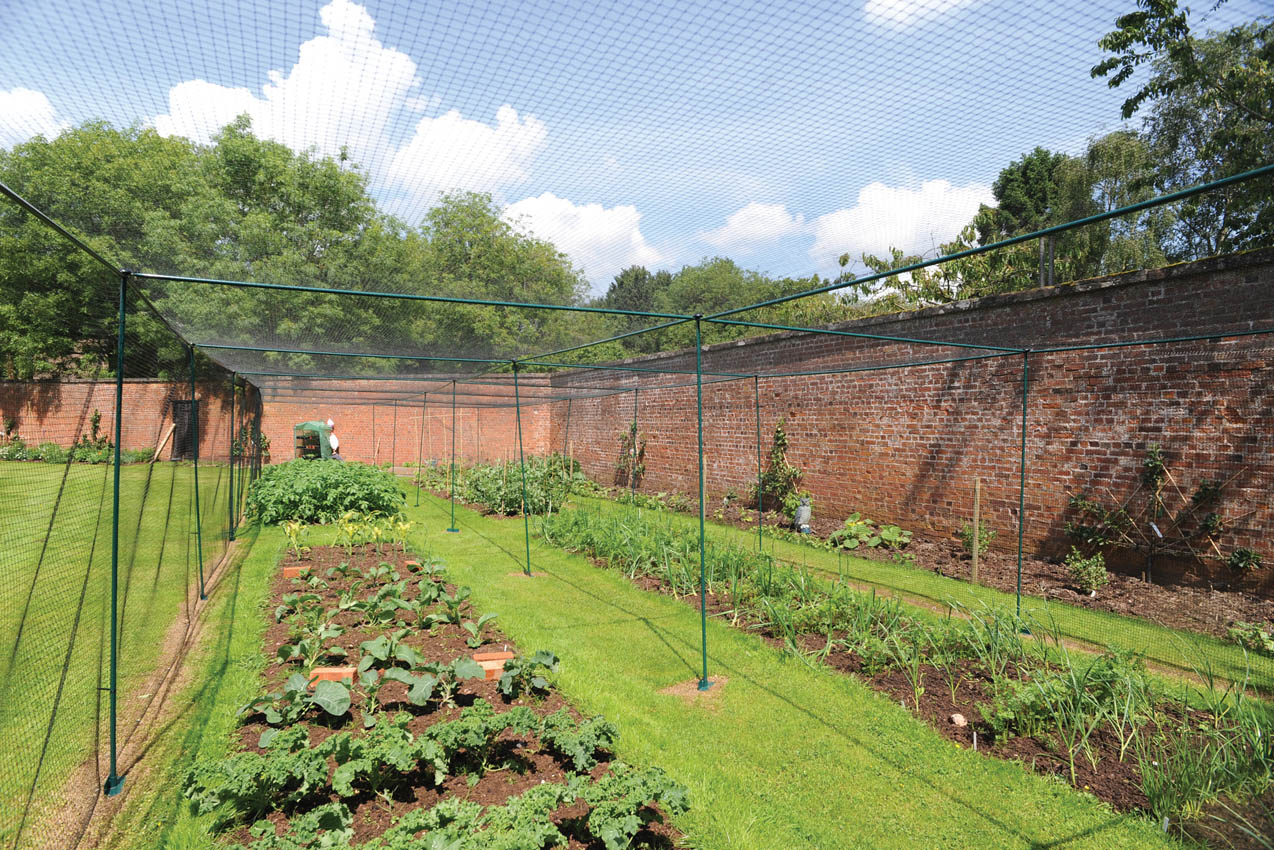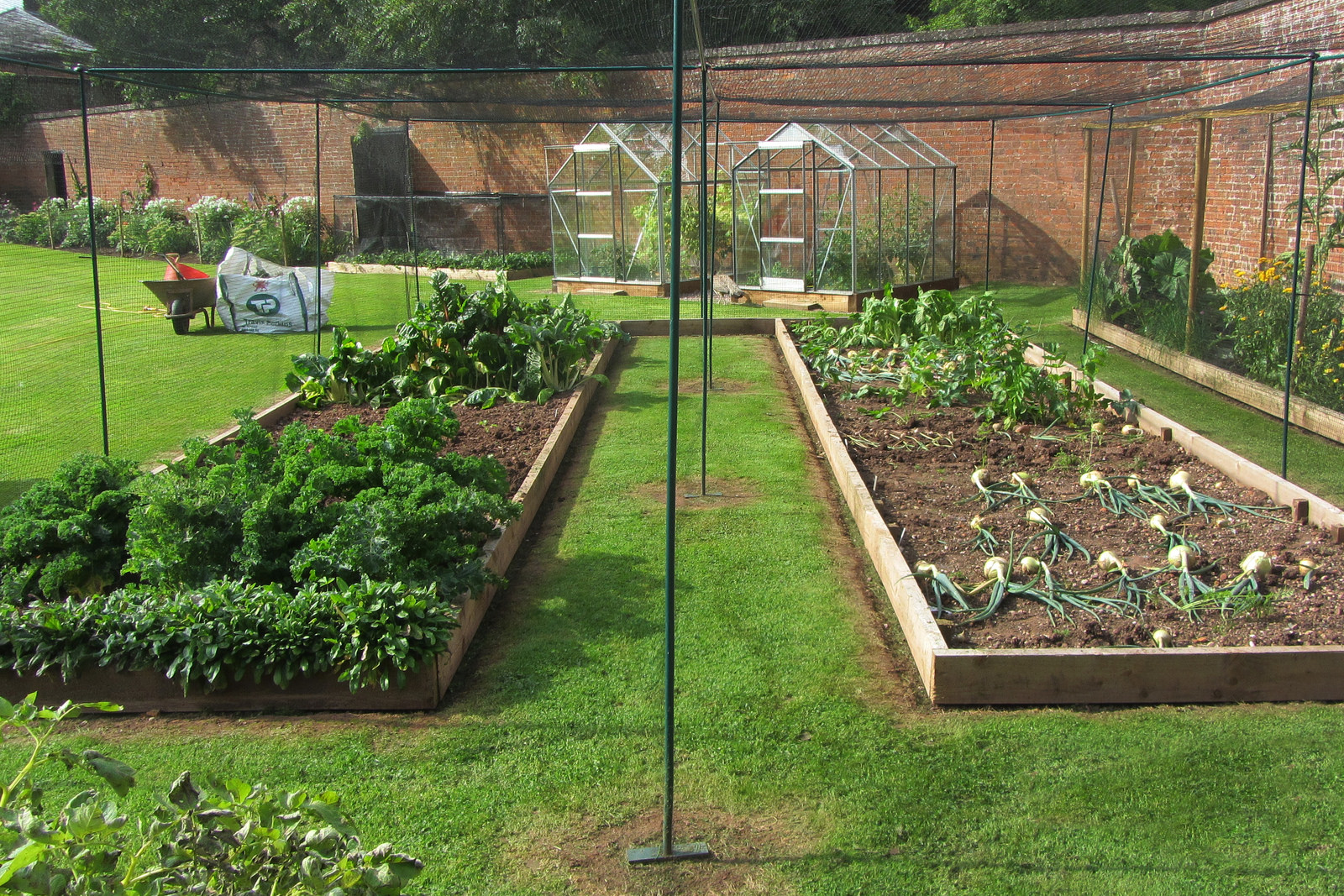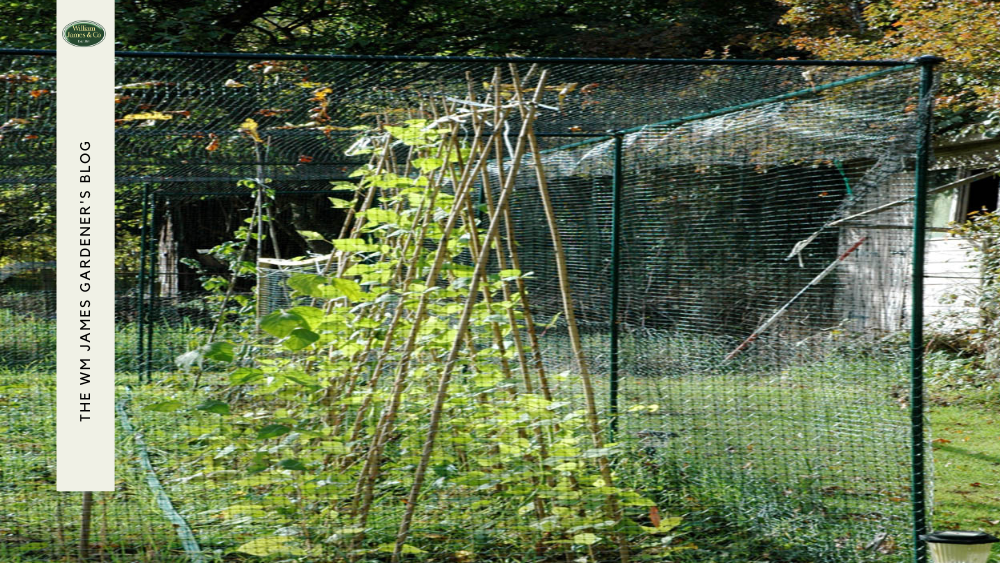We use cookies to make your experience better. To comply with the new e-Privacy directive, we need to ask for your consent to set the cookies. Learn more.
The Ultimate Guide to Buying Fruit Cages
- Admin
- WM James Gardening Blog
- 20 Jul 2025
-
178views

WM James’s Ultimate Guide to Buying Fruit Cages breaks down everything you need to know about choosing the best fruit or vegetable cage for your allotment, garden, or green space, from picking the right size and materials to setting it up.
Whether you're a green-thumbed gardener with a passion for homegrown produce or you're a newbie in cultivating, fruit cages are the best choice for everyone who wants to protect their crops.
So, in this guide, we'll answer some frequently asked questions, discuss our fruit cage options, and help you decide which one to buy for your garden or allotment.
Here’s what we cover – you can head straight to each section below or read through our entire guide for the full scoop:
- A Quick Breakdown of Fruit Cage Recommendations
- What Size Fruit Cage Should You Buy?
- What's the Best Fruit Cage Frame Material?
- What Netting Do You Need for a Fruit Cage?
- William James & Co Fruit Cage Options
- Deciding Which Fruit Cage to Buy
A Quick Breakdown of Fruit Cage Recommendations
If you’re looking for a quick recommendation on which fruit cage is best for you, take a look at our breakdown here, or watch our video guide.
| Types of Fruit Cage | Characteristics | Best For | Price |
| Aluminium Fruit Cage |
|
Gardeners and commercial growers wanting durability and quality at a lower cost. | Walk-in from £236.92 Low from £115.64 |
| Steel Fruit Cage |
|
Windy or exposed gardens or allotments needing extra strength. More premium choice. |
Walk-in from £327.70 Low from £144.30 |
| Wooden Fruit Cages |
|
Aesthetic gardens or heritage-style settings. | From £200 up to £500+ |
| DIY Metal Fruit Cages |
|
Custom shapes or budget builds | Dependent on size |
What Size Fruit Cage Should You Buy?
| Walk-in Fruit Cages | Low Fruit Cages | |
| Length | From 2 to 9 metres | From 1 to 5 metres |
| Width | From 2 to 9 metres | From 1 to 5 metres |
| Height | 2 metres above ground | 1.2 metres above ground |
Fruit Cage Height
You have two options when it comes to fruit cage height sizes: a walk-in fruit cage and a low vegetable cage.
Walk-in fruit cages are…
- 2 metres above ground level
- Perfect for those with large allotment plots, bigger gardens, or public/commercial growing spaces.
- Great if you plan on growing taller crops, such as raspberries, blackberries, or even small fruit trees.
- Provides a spacious area for your plants to grow and thrive.
- Walk-in design allows easy access and maintenance of your crops.
Low fruit cages, on the other hand, are…
- 1.2 metres above ground level
- Suitable for smaller gardens or for protecting smaller plants from pests and wildlife.
- More compact, but still spacious enough for your veggies and fruit to flourish.
- Easier to fit into different areas of your garden or allotment.
- Fruit Cage Length & Width
The width and depth of a fruit cage will be determined by what plants and vegetables you want to grow and what type of animal or bird is likely to attack your crop.
To help with this decision, it's worth thinking about what access you'll need on either side of your fruit cages, for example, whether there are any fences, walls or buildings that might restrict the width of what you can install.
Best Fruit Cage Shape
A good shape to consider is a rectangle, which will allow for more growing space without restricting your access. And with its four corners, this shape also allows you many options as to where it could be positioned on your plot and what direction it faces.
While many fruit cage suppliers offer you standard sizes, William James lets you build a fruit cage to your specs to match your plot size exactly. This will help you match your ideal length and width, but height is also an important consideration.

What's the Best Fruit Cage Frame Material?
Your choice of fruit cage frame material will be driven by two things mainly: how it looks and how long you want it to last.
Wooden Fruit Cages
Many people like the traditional look and feel of wooden fruit cages, and they blend in well with the natural surroundings. However, they tend to be more expensive to buy and need maintenance since they can be prone to rot.
Metal Fruit Cages
Metal fruit cages are a much more popular option because they last longer and are more sturdy than their wooden counterparts.
There are 2 types of metal fruit cages, which are…
| Aluminium Fruit Cages | Steel Fruit Cages |
| Aluminium, though lighter, is robust, durable and easier to erect and move around. It's a good choice for smaller gardens where the budget might be a bit of an issue. If you're in a sheltered spot, aluminium is a great choice and will last for many years. |
Steel fruit cages offer the option of being heavy-duty and long-lasting and, in our experience, are the top choice alongside aluminium. If your location lacks shelter and is prone to high winds, steel will be resilient and last a long time. |
At WM James & Co, we manufacture both steel and aluminium fruit cages, offering you a great choice of high-quality materials and sizes. Our cages are renowned for being long-lasting and easy to install.
We also provide all the necessary equipment and accessories for installing or replacing parts of your cage, such as bird deterrents and netting, ground anchors and much more.
What Netting Do You Need for a Fruit Cage?
As a general guide, we recommend a mesh size of 18mm or 20mm for fruit cages, as this will keep out most size birds, as well as cats and foxes.
If you want to keep out specific bird species, we also recommend the following mesh sizes:
- Sparrow – 19mm
- Starling – 28mm
- Pigeon – 50mm
- Gull – 75mm
Other things you want from fruit cage netting include:
- Weatherproofing
- UV-protection
- Rot-protection
- Lightweight and easy-to-handle
When it comes to netting type, a knotted mesh is the most common way of manufacturing netting. However, a woven, knotless mesh (like the netting we manufacture) makes the net much softer to handle and more robust than its knotted counterpart.
A definite plus!
We sell durable, rot-proof polyethylene fruit cage netting, which weighs 80 gsm — more durable than other netting types, which often weigh in at 60 gsm. Our superior netting means replacing your netting less often and protecting your plants for longer.
How Much Netting Do You Need?
Estimating the overall square footage/meterage required for your fruit cage needs to be precise. You should allow for overlaps and wastage when you are cutting and fitting. You don't want to be too short in any areas that would leave gaps.
You don't need to worry about this when you buy a package deal that includes a fruit cage frame and net. We cut the netting to size for every order giving you peace of mind that your structure and netting match perfectly.
Find Your Ideal Fruit Cage & Netting Package

William James & Co Fruit Cage Options
As previously mentioned, we at WMJ offer two types of fruit cages, with two types of fruit cage frames — steel and aluminium – in walk-in and low heights.
Each cage will be suitable for different gardeners, outdoor spaces, and plants, so it's best to weigh up all your options when choosing your cage.
Each cage also comes with:
- UV-stabilised, rot-proof side and roof netting
- All fixings needed
Let's discuss the range:
Premium Aluminium Walk-In Fruit Cage
Our Premium Aluminium Walk-In Fruit Cage is designed for gardeners who require a durable and long-lasting solution to protect their crops.
Manufactured from high-quality aluminium, this cage is lightweight yet robust. It can withstand various weather conditions while remaining easy to assemble and disassemble when needed.
The 1 m-wide door provides convenient access, allowing you to tend to your plants with ease.
This option is particularly suitable for larger gardens or those cultivating a wide variety of fruits or vegetables, as it offers ample space and excellent protection from birds and other pests.
It's also great if you want to easily access your crops at close proximity, as you can go inside the cage itself.
Premium Aluminium Low Vegetable Cage
The Premium Aluminium Low Vegetable Cage is designed with durability and practicality in mind. It ensures your crops are protected throughout the growing season.
Its robust aluminium frame is rust-resistant and lightweight, making it easy to assemble and reposition as needed. This fruit cage's frames are made from the same high-quality material as the walk-in option above.
The cage's compact height is ideal for covering low-growing fruit and vegetables, providing ample protection without obstructing access for maintenance and harvesting.
With this fruit cage, you'll still have easy access to your plants, especially if you're using it to protect smaller plants, but you won't be able to enter this one.
Classic Steel Walk-In Fruit Cage
Our Classic Steel Walk-In Fruit Cage is the perfect choice for those who want a robust and reliable structure to protect their fruit and vegetables.
Made with a high-quality galvanised steel framework, this cage is designed to withstand the elements while providing space for you to move around and tend to your crops comfortably.
The walk-in feature ensures easy access, making it convenient to tend to your plants.
Although a little heavier than the aluminium cages, the steel framework is finished with a green powder coating, offering both an attractive appearance and extra resistance to rust and corrosion.
This long-lasting design is ideal for year-round use and ensures that your produce remains safe from pests, birds, and other potential threats.
Classic Steel Low Vegetable Cage
This versatile and robust vegetable cage is designed to protect your smaller crops from unwanted pests, ensuring they thrive throughout the growing season.
The Classic Steel Low Vegetable Cage is easy to assemble and provides a reliable cover for small and medium-sized plants.
The galvanised steel frame is an excellent material against external factors, providing optimum protection for your plants while remaining sturdy.
The green powder-coated finish also adds an extra level of protection while blending seamlessly in your outdoor space.
This cage is perfect for use in small and large gardens, and is an excellent choice for gardeners who want to safeguard their smaller produce.
How to Build a Fruit Cage
Our fruit cages are all self-assembly, and as long as two people are working on it, you'll be good to go!
They also come with all the fixings and accessories needed for a professional set-up, so you won't need to worry about buying anything separately unless you're looking for replacement parts.
How to Build Your Own Fruit Cage
You'll need only a screwdriver, mallet, and scissors — all things you'll find in your average toolbox!
You'll receive an instructions guide with your cage, but if you're looking for a visual and audible guide, check out our handy video below.
Deciding Which Fruit Cage to Buy
Walk-in fruit cages and low fruit cages are excellent pieces of equipment if you're an avid gardener who likes to take care of their crops.
It's really a no-brainer.
So, if you're still unsure which fruit cage to choose, here are our recommendations:
- Choose a walk-in fruit cage if: You have a large garden or allotment and want to easily access your crops for pruning and harvesting. It's also suitable if you want to grow tall plants inside.
- Choose a low fruit cage if: You have a smaller garden space and only want to grow short plants that require a smaller space and less regular pruning.
- Choose an aluminium frame if: You're looking for a light frame that’s easy to assemble and resistant to rust.
- Choose a steel frame if: You want a more permanent installation that's strong and durable against the elements. Please note that steel is much heavier than aluminium.
And there you have it. Everything you need to know about our professional fruit cages! Which one will you choose for your outdoor space?
Shop our fruit cages and replacement parts below, and create the perfect safe haven for your home-grown fruits and veggies!
If you have any more questions, please feel free to contact us!
With over 60 years in the horticultural industry (not to mention our expertise in fruit cages), we know a thing or two about protecting your plants.
FAQs
Can I Get Free Delivery on My William James & Co Fruit Cage?
Yes! All our fruit cages qualify for free delivery because they're over £100.
Do You Need Planning Permission for a Fruit Cage?
Generally, the answer is no, you don't need planning permission for a fruit cage, which is a temporary structure.
However, we'd recommend checking your local council's guidance on this, just in case they have specific rules around allotments, gardening, and non-permanent structures.
Are Fruit Cages Worth It?
Fruit cages are absolutely worth the investment if you're serious about protecting your crops from pests and wildlife.
They provide a secure barrier that keeps out birds, rabbits, and other animals while still allowing sunlight and rain to nourish your plants.
They also create their own little microclimate by helping keep the plants inside a little warmer.
What is the Best Material for a Fruit Cage?
When choosing the best material for a fruit cage, it’s important to consider durability, cost, and ease of installation.
Aluminium is a popular choice due to its lightweight nature, resistance to rust, and long-lasting performance.
Steel, particularly galvanised steel, is another robust option that offers excellent durability, though it can be heavier than aluminium.
How Big Should a Fruit Cage Be?
The size of a fruit cage depends largely on the types and number of plants you intend to grow, as well as the available space in your garden.
For small fruit bushes or compact plants, a medium-sized cage may suffice.
However, if you’re growing larger fruiting plants, such as raspberries or fruit trees, you will need a taller and more spacious cage to accommodate their growth and allow easy access for maintenance and harvesting. A walk-in fruit cage might be best for this.
What Can You Grow in a Fruit Cage?
You can grow a wide variety of fruit and vegetables that are prone to common garden pests or damage.
From fruit bushes to small trees, summer and spring veggies, and even a small herb garden!
The world is your oyster when it comes to growing possibilities inside your fruit cage.






















